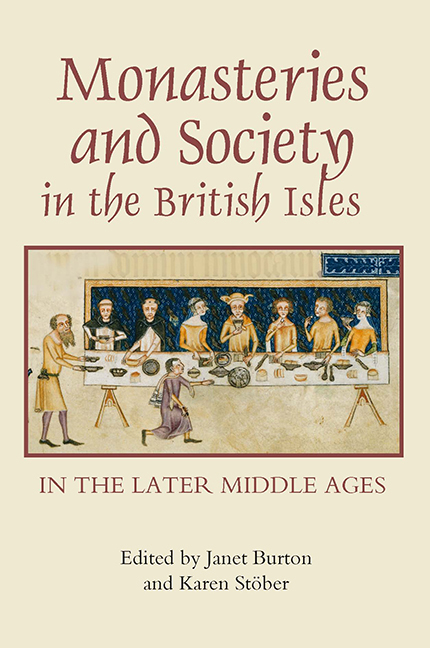Book contents
- Frontmatter
- Contents
- List of illustrations
- Acknowledgements
- List of contributors
- Abbreviations
- Introduction
- The Meeting of the Worlds
- Religious Houses and their Patrons and Benefactors
- Female Communities: Nuns, Abbesses and Prioresses
- Monasteries and Education
- Monasteries and Urban Space
- Religious Houses in the Regions
- 14 Monasteries in medieval Cornwall: Mediocrity or merit?
- 15 Monasteries and society in sixteenth-century Yorkshire: The last years of Roche Abbey
- Index of Religious Houses mentioned in the text
- Index
- Miscellaneous Endmatter
14 - Monasteries in medieval Cornwall: Mediocrity or merit?
from Religious Houses in the Regions
Published online by Cambridge University Press: 24 October 2017
- Frontmatter
- Contents
- List of illustrations
- Acknowledgements
- List of contributors
- Abbreviations
- Introduction
- The Meeting of the Worlds
- Religious Houses and their Patrons and Benefactors
- Female Communities: Nuns, Abbesses and Prioresses
- Monasteries and Education
- Monasteries and Urban Space
- Religious Houses in the Regions
- 14 Monasteries in medieval Cornwall: Mediocrity or merit?
- 15 Monasteries and society in sixteenth-century Yorkshire: The last years of Roche Abbey
- Index of Religious Houses mentioned in the text
- Index
- Miscellaneous Endmatter
Summary
It is said that the Devil, having travelled through Devon, reached the edge of Cornwall and decided to go no further. ‘Over there everywhere's called Saint this and Saint that, and anything strange that moves they put into a pasty.’ Medieval monks were more adventurous, but for them too Cornwall was unrewarding territory. Although it acquired twelve monasteries after 1100, most of these were small foundations dependent on religious houses elsewhere. As a result few Cornishmen became monks, since the opportunities to live the monastic life were limited even for those who wished to do so.
Cornwall had no monasteries in 1066. They had existed in about the seventh and eighth centuries, but by the late Saxon period there were only minsters of canons, priests, or clerks. Then, in the twelfth century, the great tide of monastic foundations in England caused ripples in Cornwall. The first monastery to be founded was the priory of St Nicholas on the Isles of Scilly, in about 1114. This was a daughter house of Tavistock Abbey (Devon), which had been given half of the islands by Henry I. The priory of Scilly, as it was known, would have been staffed by only two or three monks and a couple of servants, was wholly dependent on Tavistock, and sent its surplus revenues to its mother house. The abbots of Tavistock were apparently fond of the exotic foods that the islands produced, and reserved a supply of dried and salted puffins and seal meat when they leased the islands in 1501. Six other monasteries, all fairly small and offshoots of larger institutions, made their appearance during the twelfth and thirteenth centuries. These, with their mother houses in brackets, were the Cluniac priory of St Carroc (Montacute) and the Benedictine priories of Lammana (Glastonbury), St Mary Vale (Tywardreath), St Michael's Mount (Mont St Michel), and Minster and Tywardreath (both St Serge, Angers). Tywardreath was the biggest and wealthiest with seven monks, while St Michael's Mount probably had six, and the others only two or three each. These six monasteries, even at the height of their prosperity in about 1250, contained only about twenty-two monks, nearly all of whom were Frenchmen supplied from Angers and Mont St Michel. The English residue came mostly from Somerset.
- Type
- Chapter
- Information
- Publisher: Boydell & BrewerPrint publication year: 2008



